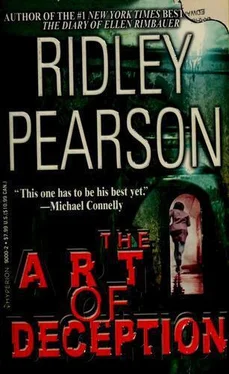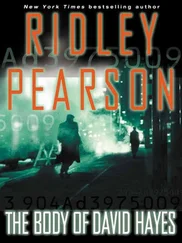Ridley Pearson - The Art of Deception
Здесь есть возможность читать онлайн «Ridley Pearson - The Art of Deception» весь текст электронной книги совершенно бесплатно (целиком полную версию без сокращений). В некоторых случаях можно слушать аудио, скачать через торрент в формате fb2 и присутствует краткое содержание. Жанр: Триллер, на английском языке. Описание произведения, (предисловие) а так же отзывы посетителей доступны на портале библиотеки ЛибКат.
- Название:The Art of Deception
- Автор:
- Жанр:
- Год:неизвестен
- ISBN:нет данных
- Рейтинг книги:3 / 5. Голосов: 1
-
Избранное:Добавить в избранное
- Отзывы:
-
Ваша оценка:
- 60
- 1
- 2
- 3
- 4
- 5
The Art of Deception: краткое содержание, описание и аннотация
Предлагаем к чтению аннотацию, описание, краткое содержание или предисловие (зависит от того, что написал сам автор книги «The Art of Deception»). Если вы не нашли необходимую информацию о книге — напишите в комментариях, мы постараемся отыскать её.
The Art of Deception — читать онлайн бесплатно полную книгу (весь текст) целиком
Ниже представлен текст книги, разбитый по страницам. Система сохранения места последней прочитанной страницы, позволяет с удобством читать онлайн бесплатно книгу «The Art of Deception», без необходимости каждый раз заново искать на чём Вы остановились. Поставьте закладку, и сможете в любой момент перейти на страницу, на которой закончили чтение.
Интервал:
Закладка:
“Yeah … well …” LaMoia at a lack for words? No quick quip? “We could watch some TV,” he suggested.
“It’s past two in the morning.”
“Wind down.”
The dog nuzzled him, wanting bed as badly as she did.
“Listen,” he said, “there’s wine, beer, pop. Food. Help yourself to whatever you want. Mi casa, su casa.”
“I figured you for an empty fridge.”
“You figured wrong.”
“Meals out at diners.”
“I can see I’ve got an image problem.”
“You are not telling me you’re a cook.”
“Chef,” he said. “When it’s a guy, it’s a chef.”
“And you’re a chef?” she asked, disbelieving.
“Hell, no. A grill meister and a takeout king. Any food you want, any country, any flavor, and I can have it here in a half hour.”
“That’s a real talent, a culinary art form.”
“Exactly. Me and the kitchen phone. It’s all technique.”
“Good night, John,” she said, thanking him again.
“Happy to have you.”
The dog moved in with her sometime before sunrise, warming her feet and taking up too much of the small bed. She woke with four hours of sleep, ravenously hungry, staring out at the beauty of Elliott Bay and the lush green islands beyond, a world unaware of her problems-the exact perspective she needed at that moment. She popped open the window and drank in the sea air. It had a taste to it that she associated with this city.
LaMoia snored loudly from the far room, his Don Juan image unraveling with each breath. She smiled privately and shook off the fatigue, scratched Blue behind the ears where he liked it, and prepared herself for a shower, thinking that on this morning things were okay, going on good, and that a cup of tea and a bagel wouldn’t hurt anything at all.
Hitting the Wall
Although the Underground access discovered by LaMoia and Matthews had at first interested Boldt as a way to gain access uptown, this interest lessened when it was explained that each block of Underground stood isolated behind a retaining wall and did not, to anyone’s knowledge, connect one to the next. More than six city blocks, one hundred thousand square feet each, separated the site of Chen’s death and the Shelter. Boldt held out hope that with the help of his university contact, he would be able to gain access.
He began his day by talking a grease monkey in the police garage into taking a look at Liz’s minivan since he’d missed the appointment yesterday. He then fired off a vitriolic e-mail to Captain Sheila Hill complaining about Matthews being placed on administrative leave and suggesting that “the situation be rectified by the end of the day” if CAP was “to effectively continue its work into the investigation of Hebringer and Randolf.”
He reread it twice, spell-checked it, and sent it, convinced Hill would see the error of her ways. A political beast, Hill would not want the possible tarnish of having slowed down an active investigation that carried so much press exposure and baggage.
Boldt knew it was prosecutorial suicide to have Matthews sit down with Walker ahead of her suspension being lifted, and he now believed Walker’s mention of Hebringer and Randolf key to the investigation. He had, in fact, left Matthews a voice mail encouraging her to “set up a meet” as soon as Walker next contacted her. He’d alerted Special Ops and Technical Services, wanting them ready to move at a moment’s notice. He wanted Matthews wearing a wire around the clock and he’d asked a detective, Heiman, to write up a request for a court order to trap-and-trace incoming calls to both her office phone and cell phone.
The U.S. Attorney’s office could facilitate this request. Ferrell Walker was complicating things. Boldt wanted a rendezvous. He wanted answers.
Less than an hour later, Sandra Babcock finally came through, providing a list of property ownership of eight businesses and stores that she believed might offer access into the section of Underground where Billy Chen had lost his life. This access would circumvent the city’s refusal to allow Boldt down inside the sinkhole. Boldt gumshoed for ninety minutes, business to business, store to store, eventually gaining an audience with the vice president of SeaTel Bank, a balding man who smelled of cologne. The VP confirmed the bank sat atop an old basement and summoned a maintenance man to escort Boldt downstairs.
Boldt knew that both Randolf’s and Hebringer’s finances had been checked and double-checked. Certainly if both had been customers of this or any bank, it would have been red-flagged, but he didn’t recall that information off the top of his head, and this left him wondering if his team hadn’t made a mistake. Did the abductor troll bank lobbies looking for women cashing large checks? Looking for brunettes who wore their hair to their shoulders? He grew irritable through the waiting, wondering what the hell took a maintenance man eight minutes to reach the lobby.
There were times eight minutes meant nothing, and then there were times like this when thirty seconds could set his teeth to grinding.
“That’s him,” the VP said, pointing across the lobby. Boldt saw a gaunt man with sleepy eyes, a bad set of teeth, and tight, sinewy arms bearing a tattoo of a red rose on his left forearm.
Boldt hurried across the lobby and introduced himself. Struggling against allergies or asthma, the man wheezed, “Basement’s over here,” forgoing his name. The plastic tag on his coveralls read Per Vanderhorst. He seemed nervous, as did most people when meeting a cop for the first time. Boldt doubted he was the first cop a guy like Vanderhorst had met, but at the same time, if the guy had felony priors he wouldn’t be working for a bank like SeaTel.
“I wanted to ask if you saw any flooding in your basement when that water main broke,” Boldt said, as Vanderhorst led the way.
“Not a drop.” He forced his reply dryly from his throat, sounding like someone was choking him.
Vanderhorst used one of about twenty keys on a ring to open a door marked PRIVATE, then led Boldt down an unattractive corridor past an EXIT sign on the right and another PRIVATE door to the left. At the end of this hall they entered one marked AUTHORIZED PERSONNEL ONLY and descended two short flights of concrete-and-steel stairs, at the bottom of which Vanderhorst hit a second light switch and motioned into a sterile, immacu-lately kept basement area that provided storage.
“My daughter has a friend Vanderhurst,” Boldt leaned on the “u” in the name. He wanted to get Vanderhorst talking, open him up about the water main break, rumors of the Underground’s existence, anything he could get from the man, but he’d been given a guy who could hardly breathe, much less make conversation.
“I heard it was the Underground that flooded in this block,”
Boldt tried.
Vanderhorst wheezed. “This is dry storage mostly.” It was stone and concrete walls, steel beams supporting the low ceiling, tube lighting bouncing off white and gray paint. Rows of industrial shelving aligned north to south stretched like library stacks floor to ceiling. Cardboard boxes bearing codes in thick black marker occupied every available inch of space.
“How about below this floor?” Boldt asked. “Anything?”
“Not that I’m aware of.” The thin man stood there like a statue. Boldt asked if he’d ever found people down here who didn’t belong.
“I’m not going to say it has never happened, because I haven’t been here all that long. But this is a bank. They don’t like the idea of strangers cruising around.” They moved on.
“Couple more rooms down here you might want to see.”
He showed Boldt three other rooms, one jammed with heating/ventilation ducts and equipment; another tangled with electric, phone, and communication wires; a third, larger and much older, that housed plumbing and steam heaters no longer in use.
Читать дальшеИнтервал:
Закладка:
Похожие книги на «The Art of Deception»
Представляем Вашему вниманию похожие книги на «The Art of Deception» списком для выбора. Мы отобрали схожую по названию и смыслу литературу в надежде предоставить читателям больше вариантов отыскать новые, интересные, ещё непрочитанные произведения.
Обсуждение, отзывы о книге «The Art of Deception» и просто собственные мнения читателей. Оставьте ваши комментарии, напишите, что Вы думаете о произведении, его смысле или главных героях. Укажите что конкретно понравилось, а что нет, и почему Вы так считаете.












